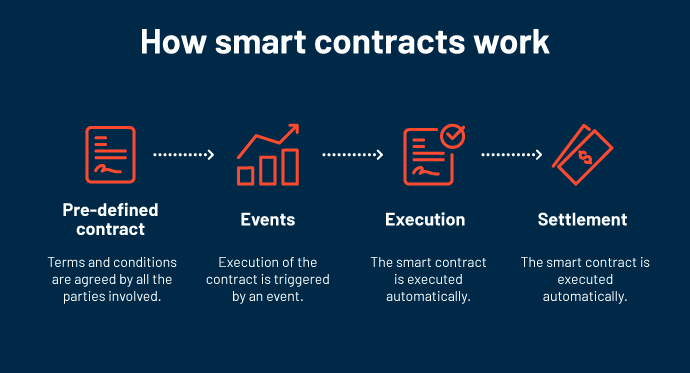Introduction to Smart Contracts
What Are Smart Contracts?
Imagine a vending machine. You drop a coin, punch in a code, and—voilà—you get a soda. No person, no negotiation, no waiting. A smart contract works similarly. It’s a self-executing digital agreement where the terms are directly written into code. These contracts run on blockchain technology and automatically carry out actions when certain conditions are met.
A Brief History of Smart Contracts
Smart contracts were first proposed in the 1990s by computer scientist Nick Szabo. Back then, it was just a concept. Fast forward to 2015, Ethereum made it a reality, integrating smart contract functionality directly into its blockchain.
Why Smart Contracts Matter Today
In a world driven by automation and digital trust, smart contracts eliminate the need for third parties, reduce human error, and enhance security. They’re the backbone of decentralized finance (DeFi), NFT transactions, and even futuristic ideas like decentralized governance.
The Core Mechanics of Smart Contracts
How Smart Contracts Work
Code-Based Agreements
At their core, smart contracts are chunks of code stored on a blockchain. They’re written in programming languages like Solidity and Rust. Once deployed, they perform actions automatically.
Blockchain Integration
These contracts are recorded on the blockchain, making them tamper-proof and visible to everyone on the network. Every interaction with the contract is logged permanently.
Automation and Trust
No need for trust—just code. Smart contracts don’t rely on people doing what they say; they execute only if conditions are met.
Key Components of a Smart Contract
Conditions
These are the “if-then” rules coded into the contract. If X happens, then Y will be executed.
Decentralized Execution
Smart contracts are run by the nodes in a blockchain network. No central authority controls the process.
Immutable Records
Once deployed, a smart contract cannot be altered. This ensures accountability but also means you’d better get the code right the first time.
Platforms That Use Smart Contracts
Ethereum – The Pioneer
Ethereum revolutionized blockchain by introducing smart contracts, making it the go-to platform for developers.
Binance Smart Chain
BSC is faster and cheaper than Ethereum, making it a popular choice for dApps and DeFi projects.
Cardano and Others
Cardano, Solana, Polkadot, and Tezos also offer smart contract capabilities, each with unique features like enhanced scalability or lower fees.
Use Cases of Smart Contracts
Finance and DeFi
Think lending platforms like Aave or Uniswap. Smart contracts manage funds, interest rates, and transactions—all without banks.
Real Estate
Smart contracts can automate escrow, titles, and ownership transfers, speeding up the entire buying/selling process.
Supply Chain Management
Track goods from manufacturer to store with smart contracts ensuring transparency, timestamps, and authentication.
Healthcare and Identity Verification
Medical records and identity checks can be securely stored and shared via smart contracts, ensuring privacy and trust.
Insurance and Legal Tech
Payouts for policies or dispute resolution can be automated, reducing friction and cost.
Advantages of Smart Contracts
Speed and Efficiency
Say goodbye to manual paperwork and hello to instant transactions and processes.
Transparency and Trust
Everyone can see what the contract does—no fine print, no surprises.
Security and Cost Reduction
No middlemen = fewer fees. Also, since contracts are stored on a decentralized network, they’re harder to hack or manipulate.
Challenges and Limitations
Coding Errors and Bugs
Smart contracts are “write once, run forever.” Bugs in the code can be exploited and lead to major losses.
Legal Ambiguities
Are smart contracts legally binding? Depends on where you live. The law hasn’t fully caught up yet.
Scalability and Energy Concerns
Blockchains like Ethereum can be slow and expensive during high demand, though upgrades like Ethereum 2.0 aim to fix that.
The Future of Smart Contracts
Smart Contracts in Web3 and Metaverse
These digital contracts will power virtual economies, land ownership, and digital identity in decentralized worlds.
AI-Powered Smart Contracts
Imagine contracts that learn and evolve. AI could help smart contracts become more adaptive and responsive.
Government and Regulation Involvement
More governments are looking at blockchain tech for public records, voting, and digital IDs—all potential use cases for smart contracts.
Conclusion
Smart contracts are changing the game. From finance to real estate, they offer a faster, safer, and more transparent way to do business. While challenges like legal recognition and technical bugs still loom, the potential for disruption is massive. The world is only just beginning to tap into what smart contracts can offer.
FAQs
Are smart contracts legally binding?
Not always. It depends on the jurisdiction. Some countries are adapting laws to recognize smart contracts, but many still lack legal clarity.
Can smart contracts be hacked?
The contract itself is secure if coded properly, but bugs or vulnerabilities in the code can be exploited, as seen in some DeFi hacks.
Do smart contracts require a middleman?
Nope! That’s the beauty—they cut out the need for intermediaries by automating trust.
What programming language is used in smart contracts?
Ethereum uses Solidity. Other platforms might use Rust, Vyper, or Haskell.
How do smart contracts relate to NFTs?
NFTs use smart contracts to verify ownership, transfer rights, and enforce royalties on digital assets.
Read More Article About Crypto
